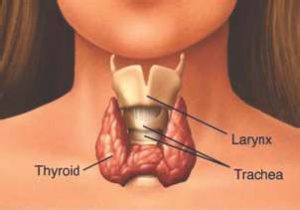Rough estimates reveal about 5 per cent of patients in the Middle East suffer from thyroid disease. The thyroid is a butterfly-shaped gland in the neck that secretes hormones into the blood stream and is mainly responsible for the body’s ability to convert food into energy ( metabolism rate) and monitors body temperature.
Dr. Moayed Alhelfi, Consultant Endocrinologist, Medeor 24×7 International Hospital, Al Ain shed light on thyroid disease, “Swelling in the thyroid gland causes a goiter. The abnormally large size of the gland is rarely due to cancer and is usually an indication of hyperthyroidism (an overactive thyroid gland) or hypothyroidism (an underactive thyroid gland). Problems with the thyroid gland affect the metabolic rate, ability to control body temperature and energy levels.”
 The main symptoms of an overactive thyroid are palpitations, excessive sweating, weight loss, heat intolerance, anxiety, tremors in the hand, and excessive hair loss from the scalp, muscle weakness, loose and frequent bowel movements and protrusion of the eyes and in the case of elderly patients, heart failure. If a patient suffers from an underactive thyroid, he or she is likely to experience excessive tiredness, unexplained weight gain, feeling cold, constipation, and increased sleep, puffiness under the eyes and aches and pains.
The main symptoms of an overactive thyroid are palpitations, excessive sweating, weight loss, heat intolerance, anxiety, tremors in the hand, and excessive hair loss from the scalp, muscle weakness, loose and frequent bowel movements and protrusion of the eyes and in the case of elderly patients, heart failure. If a patient suffers from an underactive thyroid, he or she is likely to experience excessive tiredness, unexplained weight gain, feeling cold, constipation, and increased sleep, puffiness under the eyes and aches and pains.
Thyroid diseases are caused by various factors: in some instances it can be an autoimmune condition where the body attacks the thyroid gland for unknown reasons. Iodine deficiency is the major cause of goiter, but this is fast being eradicated worldwide because iodine is readily available in the diet. Some races are more susceptible to the condition than others according to Dr. Moayed Alhelfi, Consultant Endocrinologist at Medeor 24×7 International Hospital, Al Ain. “I have come across overactive thyroid conditions in Asian ladies who live in the UAE. This is because they are quite stressed. On the other hand, Emirati women are more likely to suffer from an underactive thyroid because of their genetic makeup.”
In most cases, the thyroid condition can be controlled through medication: for an overactive thyroid, medications to suppress the overproduction of the hormone are prescribed. For those suffering from hypothyroidism, thyroid hormone replacement is administered. One of the most common Hyperthyroidism treatments today is Radioactive Iodine which can destroy all or part of your thyroid. While there are instances when you don’t need to destroy the entire gland to alleviate your hyperthyroid symptoms, the total destruction of the thyroid is most often necessary. This treatment is reliable and safe.
Depending on the dose, radioactive iodine can kill a portion, or all, of your thyroid. Your doctor will order a radioactive iodine uptake and scan to determine your dose, the cause of your hyperthyroidism, and information about your thyroid tissue. Approximately 90 per cent of patients need only one dose before they are cured of their hyperthyroidism. Though you may only need a single dose, it may take up to six months before the medication fully destroys all or part of the thyroid. Fortunately, most patients experience reduced symptoms about a month after treatment. However in extreme cases, a thyroidectomy — a surgery to remove the thyroid gland will be performed.
Dr. Moayed said, “Dysfunctional thyroid gland is removed through surgery once the operation is complete, the patient will be monitored for complications. During the surgery, to reduce the risk of vocal cord nerve Injury, we use a neuromonitor device to detect the position of the vocal cord nerve. For most patients, walking and normal routines can resume the day after the operation, but vigorous activity and heavy lifting are not recommended for two weeks.”
Most patients are concerned about the thyroid surgery affecting vocal cords and ultimately speech, but Dr. Moayed explained that, “Some patients may notice subtle voice changes or the voice may tire by the end of the day; these voice alterations generally normalize within 2-3 months. If voice changes persist, patient should advise the surgeon or endocrinologist to evaluate further. And, some patients may require lifetime thyroid hormone replacement when one or both lobes of the thyroid are removed.”














